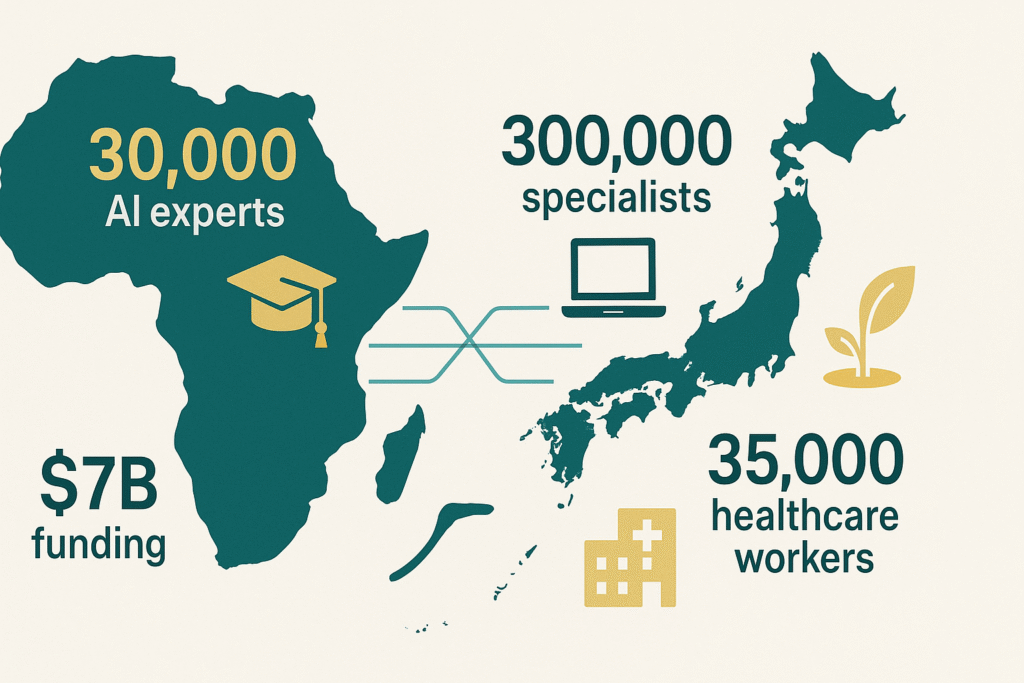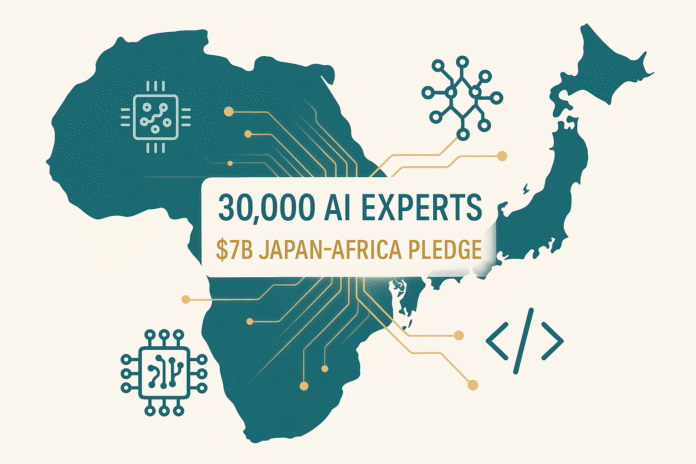YOKOHAMA — In a landmark pledge at the Tokyo International Conference on African Development (TICAD-9), Japan announced it will train 30,000 artificial intelligence (AI) experts across Africa over the next three years. The initiative, backed by a $7 billion support package, is designed to accelerate digital transformation, spur entrepreneurship, and create skilled jobs across the continent.
Prime Minister Shigeru Ishiba told leaders from more than 50 African nations gathered in Yokohama:
Japan’s goal is to support the training of 30,000 AI experts over the next three years to promote digitisation and create jobs.
Shigeru Ishiba
The scale of the announcement is striking. Beyond the AI experts, Japan also plans to train 300,000 specialists in broader technical fields and 35,000 healthcare professionals, alongside a financing mix of $5.5 billion in loans (in partnership with the African Development Bank) and $1.5 billion in impact investments targeting renewable energy, green growth, and digital ecosystems.
African leaders’ reactions: cautious optimism
The pledge drew a broadly warm welcome, but not without caution.
- The African Union Commission Chairperson called for “stronger Africa-Japan cooperation,” stressing that digital partnerships must be bold and innovative.
- Angolan President João Lourenço, speaking as AU Chair, acknowledged the significance of the pledge but warned of “persistent barriers and limited, complex access to international financing,” a reminder that even concessional loans can weigh heavily on African economies.
- UN Secretary-General António Guterres sharpened the point: “AI must now mean Africa is included.” His words echoed concerns that large AI projects often risk deepening divides if rural and under-resourced regions are not adequately integrated into these initiatives.
The underlying sentiment is enthusiasm for human capital investment, but questions remain about whether such commitments will translate into long-term, inclusive impact.
Why the Japan $7B Africa AI training pledge matters now
Africa is on the cusp of a demographic and digital transformation. By 2030, the continent will be home to nearly one-third of the world’s youth, a vast pool of potential innovators. Mobile penetration is increasing, fintech ecosystems are maturing, and governments are starting to develop national AI strategies.
Yet gaps remain stark: only about 40% of Africans have reliable internet access, power outages remain frequent in many countries, and local universities often lack the resources to run advanced computing labs. Without parallel investment in infrastructure and governance, training 30,000 experts risks becoming an exercise in producing credentials without capability.

Lessons from past programs
Japan is not new to capacity-building in Africa. Through JICA and other development agencies, it has funded programs in healthcare, infrastructure, and disaster resilience. Where these efforts have succeeded, three factors stand out:
- Local relevance – Training linked to solving African problems (like AI for crop yields or disease diagnostics) drives adoption.
- Strong partnerships – Programs co-run by governments, universities, and private companies tend to have staying power.
- Incremental scaling – Pilots in a few nations that are refined before continental roll-outs often outperform grand one-size-fits-all launches.
The challenge has often been sustainability. When donor funding dries up, many initiatives struggle to continue at the same scale. That risk looms here too.
What could go right?
If Japan’s pledge is implemented thoughtfully, the upside is enormous.
- Job creation and entrepreneurship: Africa’s AI talent pool could expand significantly, spawning startups that leverage machine learning to drive innovation in agriculture, logistics, and healthcare.
- Policy influence: By tying the program to the Yokohama Declaration and the “Hiroshima AI Process,” Japan positions itself as a partner in shaping Africa’s AI governance, ethics, and standards.
- Geopolitical balance: Unlike China’s heavy focus on infrastructure or the West’s piecemeal digital initiatives, Japan’s emphasis on skills and sustainability could carve out a unique, respected niche.
Risks and weak points
But there are clear hazards.
- Infrastructure gaps: Without stable electricity, broadband, or GPUs, training will be constrained.
- Brain drain: Well-trained graduates may migrate to Europe or North America if local opportunities are lacking.
- Curriculum alignment: If courses are too theoretical or imported wholesale from Japan without adaptation, graduates may lack the practical skills local industries need.
- Debt sustainability: $5.5 billion in loans, even if concessional, could weigh on already strained budgets.
Japan $7B Africa AI training: chances of success
Examining the numbers, political buy-in, and Japan’s track record, the pledge has a solid foundation. Over 50 African leaders endorsed the outcomes of TICAD-9, signalling a rare continental alignment. Japan’s combination of grants, loans, and private capital suggests flexibility, and the focus on human capital rather than just physical infrastructure is forward-looking.
Yet success will hinge on execution. If Kenya and Uganda — the pilot sites for AI and data science programs — can produce high-quality graduates who find local opportunities, momentum will build. If, however, training remains clustered in elite universities, with little spillover to rural regions or SMEs, the program risks reinforcing inequalities rather than bridging them.
The likeliest outcome? A mixed picture: visible short-term wins in flagship nations, slower trickle-down impact elsewhere. Long-term sustainability will depend on whether African governments and institutions integrate these programs into their own budgets and strategies after Japan’s three-year horizon.
What’s next
Implementation details are now the critical missing piece. Which universities will host the programs? How will faculty be trained? Will graduates be funnelled into startups, government labs, or multinational companies?
The African Development Bank, JICA, and national governments are expected to unveil more specifics in the coming months. Observers will watch for three green lights:
- Localised, sector-relevant curricula.
- Infrastructure and connectivity investment alongside training.
- Transparent reporting of outcomes: not just “30,000 trained,” but how many are working in AI-driven roles in Africa.
If these boxes are ticked, Japan’s $7B gamble could mark a turning point in Africa’s digital trajectory — not just producing coders, but catalysing a generation of AI builders grounded in African realities.

